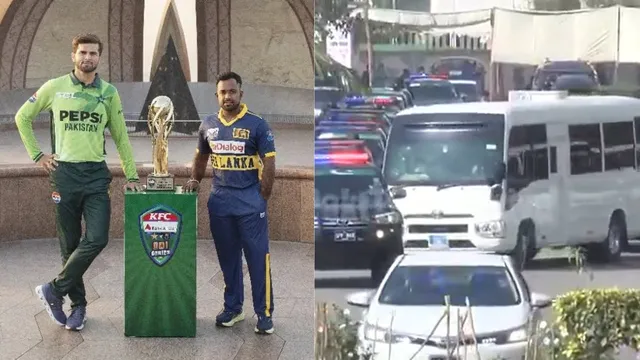- By Supratik Das
- Fri, 14 Nov 2025 05:30 PM (IST)
- Source:JND
As Sri Lanka faces Pakistan in a high-profile cricket fixture amid renewed security fears across the nation, an old video showing the Sri Lankan team’s heavily guarded movement through Rawalpindi has resurfaced online, reigniting debate over Pakistan’s vulnerability to militant threats. Although the clip is not from the current tour, its reappearance has intensified public scrutiny on the country’s ability to protect visiting teams at a time of heightened alert.
The viral video showed the team bus rolling out with armoured jeeps in front, paramilitary units packed into pickup trucks behind, and layers of plainclothes personnel lining the short but tightly sealed route. Soldiers stood along footpaths normally busy with commuters, and snipers watched from rooftops.
The suicide blast that triggered this sudden tightening killed twelve people and injured nearly thirty. This was carried out in broad daylight in a zone long considered impenetrable. Tehreek-e-Taliban Pakistan (TTP), later claimed responsibility, warning it would continue targeting state institutions.
No.. It’s not Donald Trump in Pakistan. It’s Sri Lanka Cricket team returning to hotel from an optional practice session at Rawalpindi. #PAKVSL
— Nibraz Ramzan (@nibraz88cricket) November 14, 2025
pic.twitter.com/CgfaX0TJXv
Persistent Pattern of Instability
The anxiety surrounding this incident has roots stretching far back. Pakistan’s security challenges have never truly disappeared; they simply shift from one faultline to another.
The latest incident has once again stirred memories of Pakistan’s haunted past with cricket-related security failures. The most traumatic was the 2009 attack on the Sri Lankan team bus in Lahore, when gunmen opened fire, injuring six players and killing eight Pakistani policemen. That assault drove international cricket out of Pakistan for nearly ten years, forcing the Pakistan Cricket Board (PCB) to shift its “home” matches to the UAE.
Before that, major security breaches had repeatedly shadowed visiting sides, from the 2002 Karachi car bomb near the New Zealand team hotel to the wave of Lahore blasts in 2008 that prompted Australia to withdraw. Even crowd-related assaults in the 1980s and 1990s had once shaped Pakistan’s reputation as one of the most unpredictable cricketing venues.
For now, Sri Lanka has opted to stay on. But the atmosphere surrounding this tour has reinforced a sobering truth, Pakistan, despite its deep cricketing passion, remains a battleground of risks whenever it hosts the sport, a reality that continues to test the resolve of players, boards, and fans alike.
The chairman of PCB and Federal Interior Minister, Mohsin Naqvi, said that since state-level security is now being provided to the visiting team, their security is now being looked after by the army and rangers in conjunction with the police. Mr. Naqvi also told the media in Rawalpindi on Thursday that the Sri Lankan government and board had shown great support for Pakistan cricket by continuing with the tour.

